Carr’s threats to ABC are jawboning any way you slice it
The full timeline points to government influence in ABC’s final decision
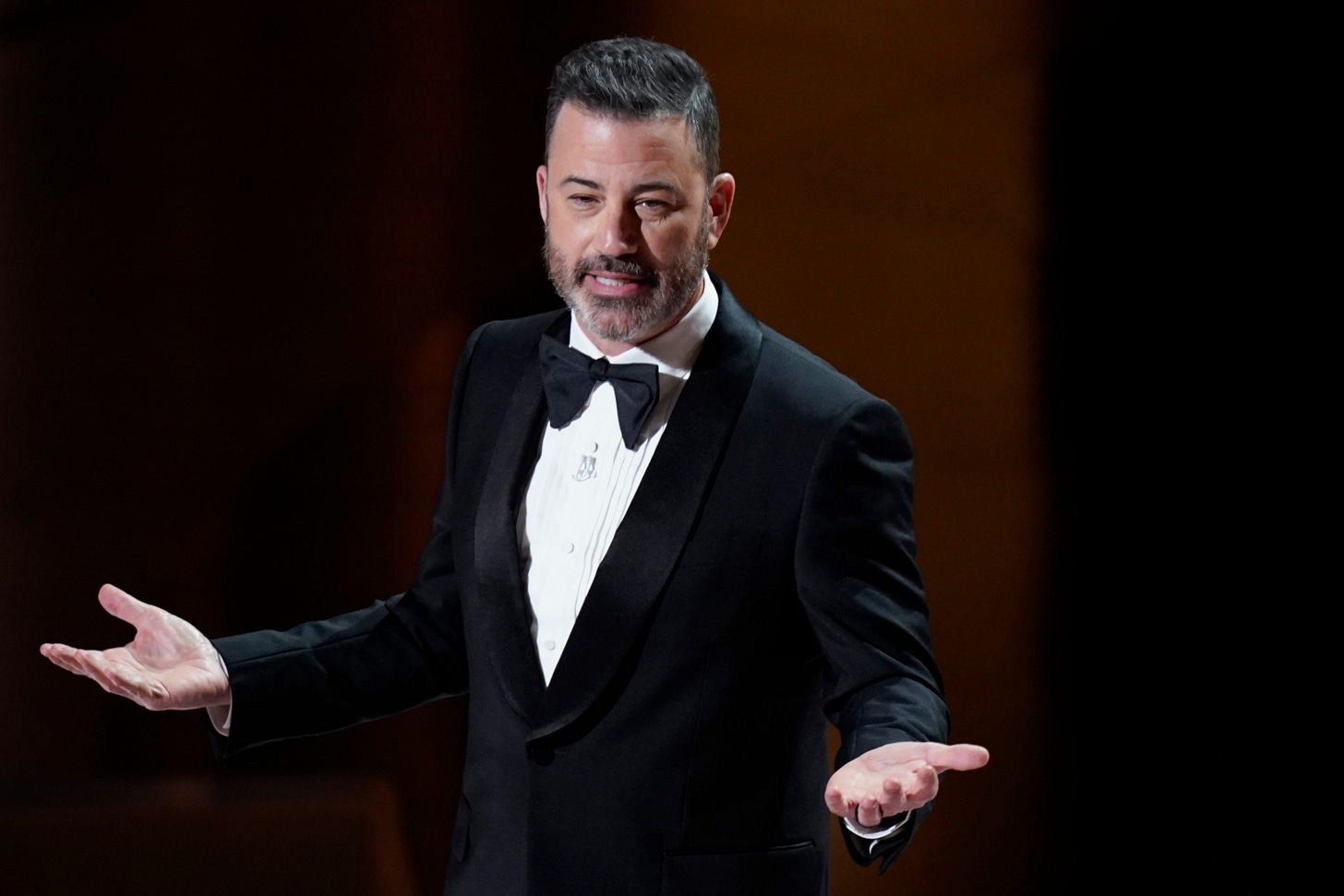
In 1867, the Supreme Court ruled in Cummings v. Missouri that the state could not use loyalty oaths to bar ex-Confederates from teaching, preaching, or practicing law. The oaths themselves were (at the time) lawful, but Missouri was using them to unlawfully punish past conduct — and that was the problem.
“What cannot be done directly cannot be done indirectly,” Justice Stephen Johnson Field wrote for the majority. “The Constitution deals with substance, not shadows.”
Over 150 years later, ABC suspended Jimmy Kimmel hours after FCC Chair Brendan Carr suggested they could face consequences for remarks Kimmel made in the aftermath of Charlie Kirk’s murder.
Unlike the formal government pressure in Cummings, this was informal government pressure to influence private action, otherwise known as jawboning. But the age-old principle is the same. It was echoed in last year’s landmark jawboning case NRA v. Vullo “a government official cannot do indirectly what she is barred from doing directly.”
Carr’s defenders try to deny any connection between Carr’s threats and Kimmel’s ouster.
This has one big problem. Courts have said it doesn’t matter whether a threat produces results. In Backpage.com v. Dart, the Seventh Circuit held that the constitutionality of government conduct turns on what the threat tries to accomplish, not whether it accomplishes it.
Given that, Carr’s threat still runs headlong into the First Amendment.
The bar was laid out clearly in last year’s Vullo: “to state a claim that the government violated the First Amendment through coercion of a third party, a plaintiff must plausibly allege conduct that, viewed in context, could be reasonably understood to convey a threat of adverse government action in order to punish or suppress the plaintiff ’s speech.”
Let’s see how that squares with the timeline.
July 22: Days after CBS cancels the Late Show with Stephen Colbert, with the question of FCC approval for parent Paramount Global’s merger with Skydance looming large over it, Trump posts:
August 6: Trump tells the press pool regarding Kimmel and Late Night host Jimmy Fallon, “They’re next, they’re going to be going — I hear they’re going to be going.”
August 11: Sinclair Broadcast Group shares surge 27% after it announces efforts to explore merger-and-acquisition opportunities in broadcast TV. Any transfer of broadcast licenses requires FCC approval, which FIRE has written extensively about Carr using as a “point of leverage for the government.”
August 19: Nexstar Media Group, the nation’s largest TV station owner, announces plans to buy rival media giant Tegna in a deal that will require FCC approval and FCC willingness to lift their 39% cap on how many households one company can reach through TV station ownership. Nexstar currently reaches 38.9% of households.
September 4: The Center for American Rights files a complaint with the FCC over Jimmy Kimmel’s alleged bias and conflict of interest towards Democrats. CAR’s 60 Minutes complaint launched the now infamous FCC probe into CBS, which informed Trump’s lawsuit, and they filed complaints against ABC and NBC, which were revived by Carr early this year.
September 10: Charlie Kirk is murdered while giving a talk at Utah Valley University.
September 15: Kimmel says in his opening monologue:
We hit some new lows over the weekend with the MAGA gang desperately trying to characterize this kid who murdered Charlie Kirk as anything other than one of them and doing everything they can to score political points from it.
It’s worth noting the accuracy of his statement hinges on whether the “MAGA gang” was trying to avoid association with Kirk’s killer, not on whether the killer was part of the “MAGA gang.” It’s an important distinction when official actions are being considered.
September 17: Carr appears on The Benny Johnson Show, with Johnson posting a summary at 1:01 pm, Carr addressing ABC parent Disney says:
"This is a very, very serious issue right now for Disney. We can do this the easy way or the hard way. These companies can find ways to take action on Kimmel or there is going to be additional work for the FCC ahead."
Carr also addresses the station owners:
Disney needs to see some change here, but the individual licensed stations that are taking their content, it’s time for them to step up and say this, you know, garbage, to the extent that that’s what comes down the pipe in the future, isn’t something that we think serves the needs of our local communities.
6:18 pm: Later that day, it’s reported that Nexstar has said it will suspend Kimmel’s show “indefinitely beginning tonight.”
6:24 pm: Minutes later, it’s reported that Disney’s ABC says it is pulling the show.
6:49 pm: Sinclair joins Nexstar in indefinitely suspending Kimmel’s show.
6:59 pm: CNN reporter Brian Stelter says when asked about ABC pulling Kimmel’s show, Carr sent him a celebratory GIF:
7:00 pm: Carr writes on X, “I want to thank Nexstar for doing the right thing … I hope that other broadcasters follow Nexstar’s lead.”
8:04 pm: Trump celebrates:
8:38 pm: Sinclair says its ABC stations will air a special remembrance of Charlie Kirk this Friday during Jimmy Kimmel Live’s timeslot, adding: “Sinclair also calls upon Mr. Kimmel to issue a direct apology to the Kirk family. Furthermore, we ask Mr. Kimmel to make a meaningful personal donation to the Kirk Family and Turning Point USA.”
11:43 pm: Carr responds to a post on X saying, “This was all in Project 2025, btw”:
September 18: Carr replies to a post from British commentator Piers Morgan, attributing Kimmel’s suspension to “outrage all across America.” It’s difficult to find evidence of “outrage all across America” before September 17.
That’s the timeline, so let’s break it down.
Carr tells ABC that “we can do this the easy way or the hard way” and that “there’s going to be additional work ahead for the FCC” if they don’t “take action.” There’s the threat and the adverse action — possibly in the form of an FCC probe into CAR’s complaint — if they don’t accede to the threat.
We also see Carr prompt affiliate station owners like Nexstar and Sinclair — seeking regulatory favor in pressing business before the government — to dial up the pressure on Disney in the lead up to Kimmel’s ouster. The specter of disfavorable treatment from the government poisons the chain from top to bottom. Finally, Trump and Carr celebrate after ABC suspends Kimmel indefinitely.
Asked to respond to those condemning him for “bullying ABC” on The Scott Jennings Show, Carr says “we’re reinvigorating the public interest standard for broadcasters. If people don’t like that … If you're a broadcaster and you don’t like being held accountable for the first time, in a long time, to your public interest standard, you can turn your broadcast license in to the FCC.”
The public-interest standard is the nearly century-old mandate that broadcasters use the spectrum medium in service of the public. But the FCC’s public-interest standard has never made it okay to censor people. Even the FCC clearly states in no uncertain terms that “the public interest is best served by permitting free expression of views.”
That’s because the public interest standard is a creature of statute, subordinate to the Constitution and the First Amendment. The FCC’s governing rules accordingly deny the FCC “the power of censorship” as well as the ability to promulgate any “regulation or condition” that interferes with freedom of speech.
And Carr has long understood this. As he wrote in 2019, “The FCC does not have a roving mandate to police speech in the name of the ‘public interest.’”
He’s not alone either.
Republican members of Congress leading telecommunications regulation share his familiarity with the limits on the FCC’s power to regulate speech, as demonstrated by their cold reception to his recent threats. Brett Guthrie, chair of the House Committee on Energy and Commerce, said: “We have to be extremely cautious to try to use the government to influence what people say.”
Senator Ted Cruz, chair of the Senate Committee on Commerce, Science, and Transportation, was more explicit. “That’s right out of Goodfellas. That’s right out of a mafioso coming into a bar going, ‘Nice bar you have here. It’d be a shame if something happened to it’” he said, referring to Carr’s threats.
He went on to make an important point, recognizing that Carr’s “dangerous as hell” action was setting a troubling precedent because his Republican Party won’t always hold the keys to the FCC.
Three years ago, Carr wrote: “The government does not evade the First Amendment’s restraints on censoring political speech by jawboning a company into suppressing it—rather, that conduct runs headlong into those constitutional restrictions, as Supreme Court law makes clear.”
That’s exactly right, and if anyone knows what Brendan Carr is doing right now is unconstitutional jawboning — it’s Brendan Carr, as the record clearly shows.



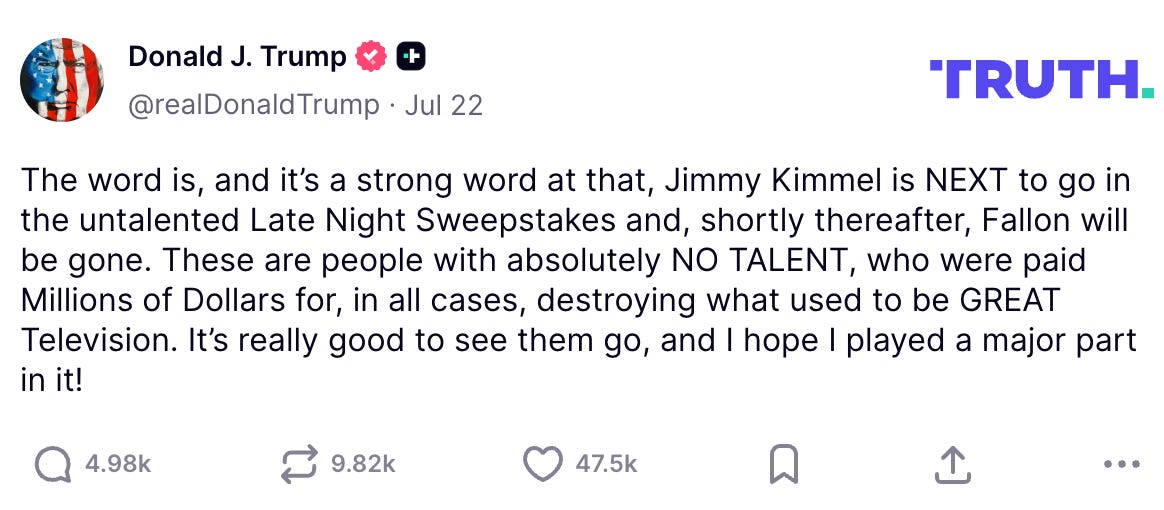
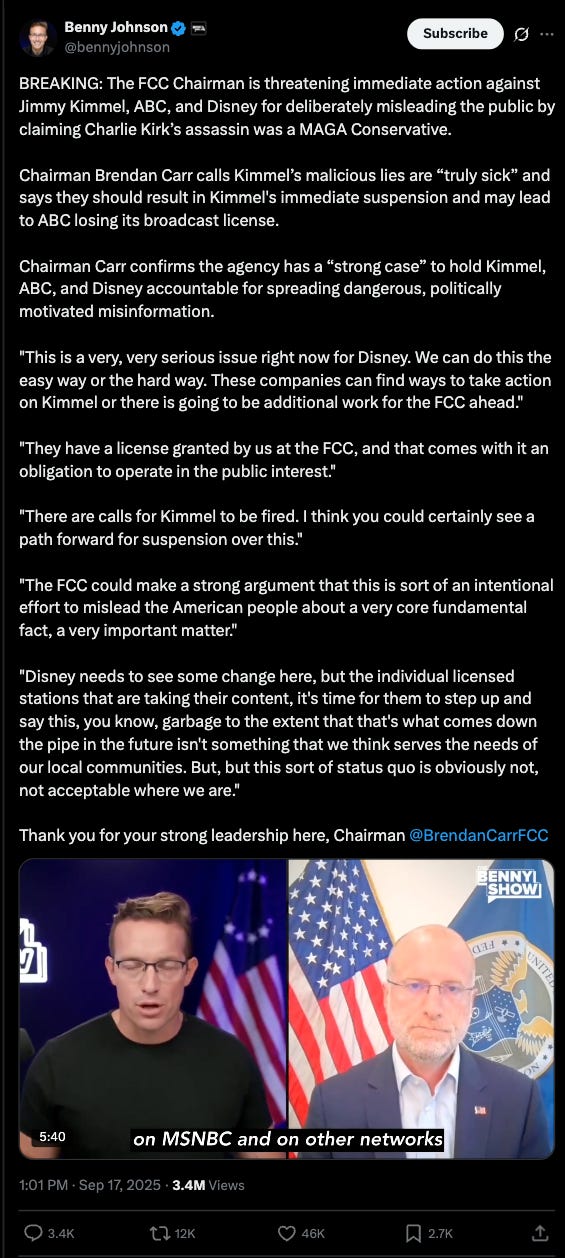
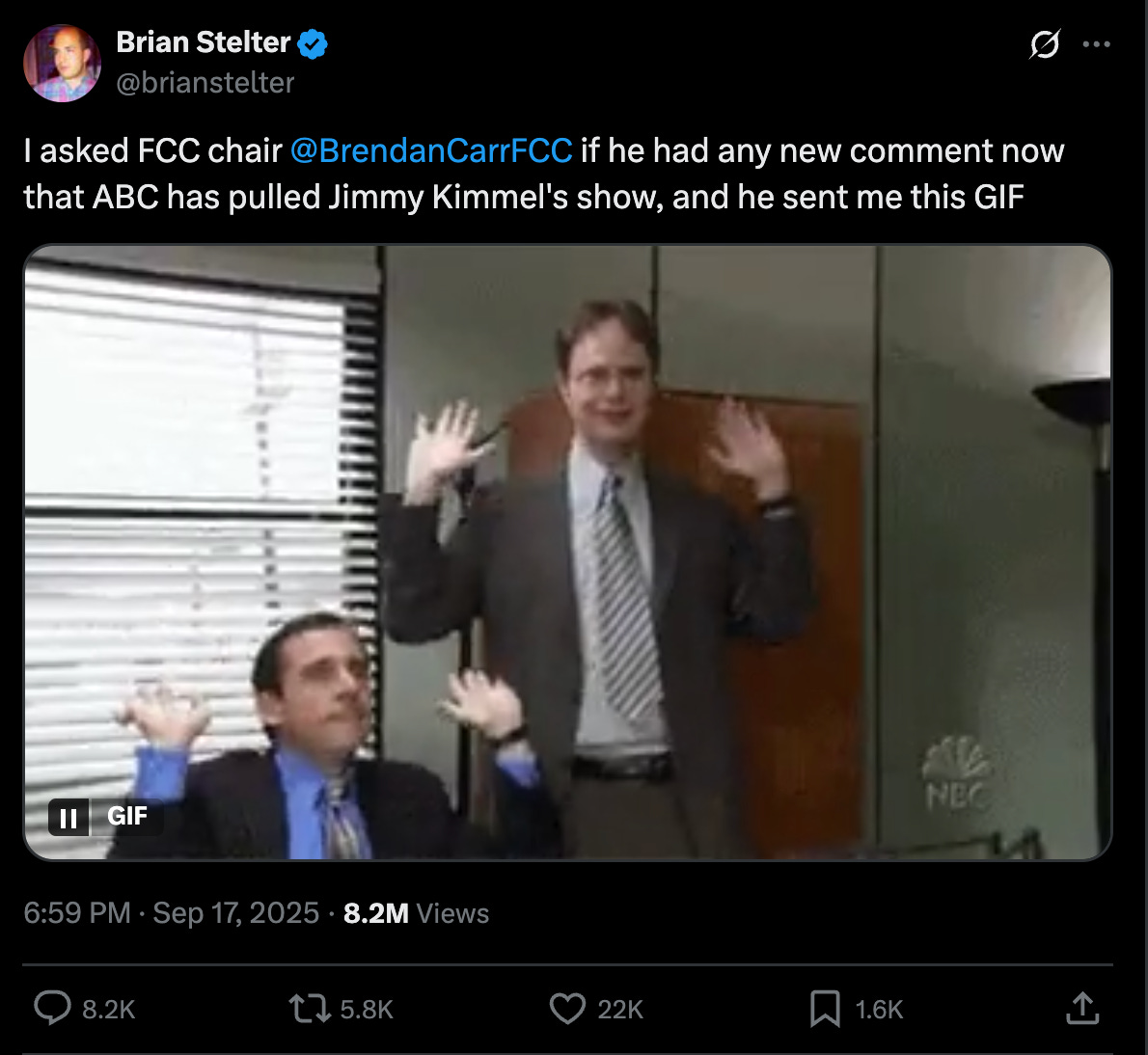
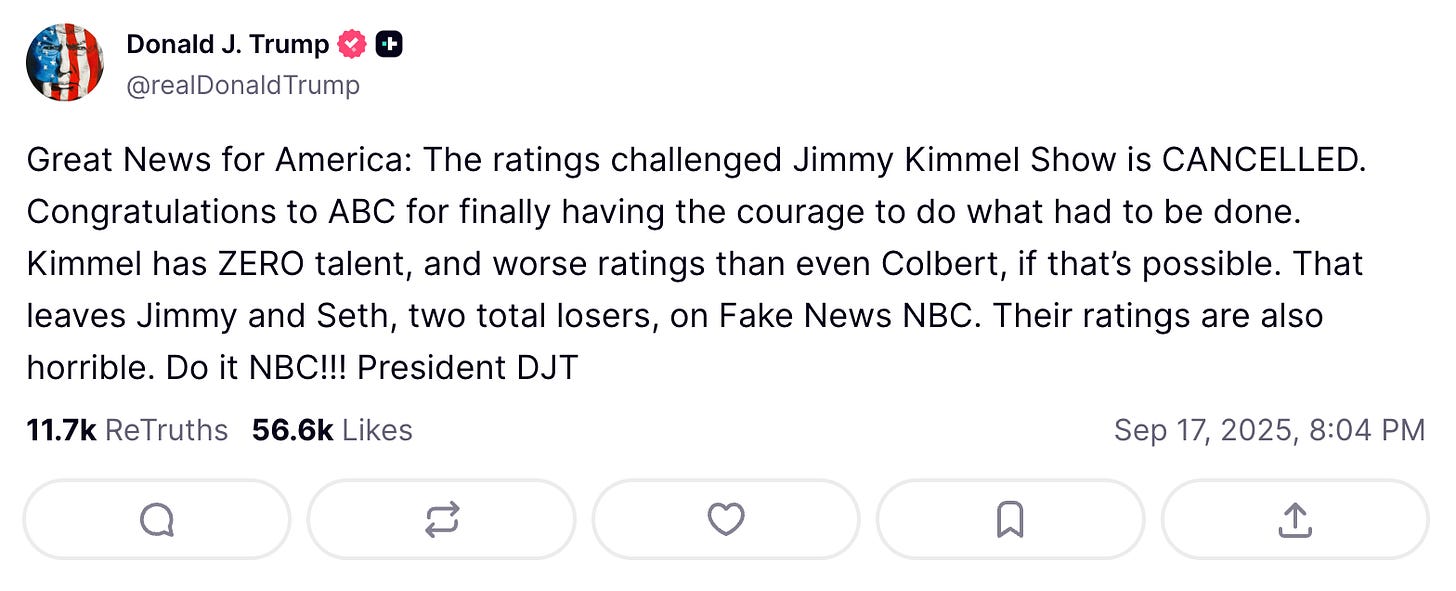
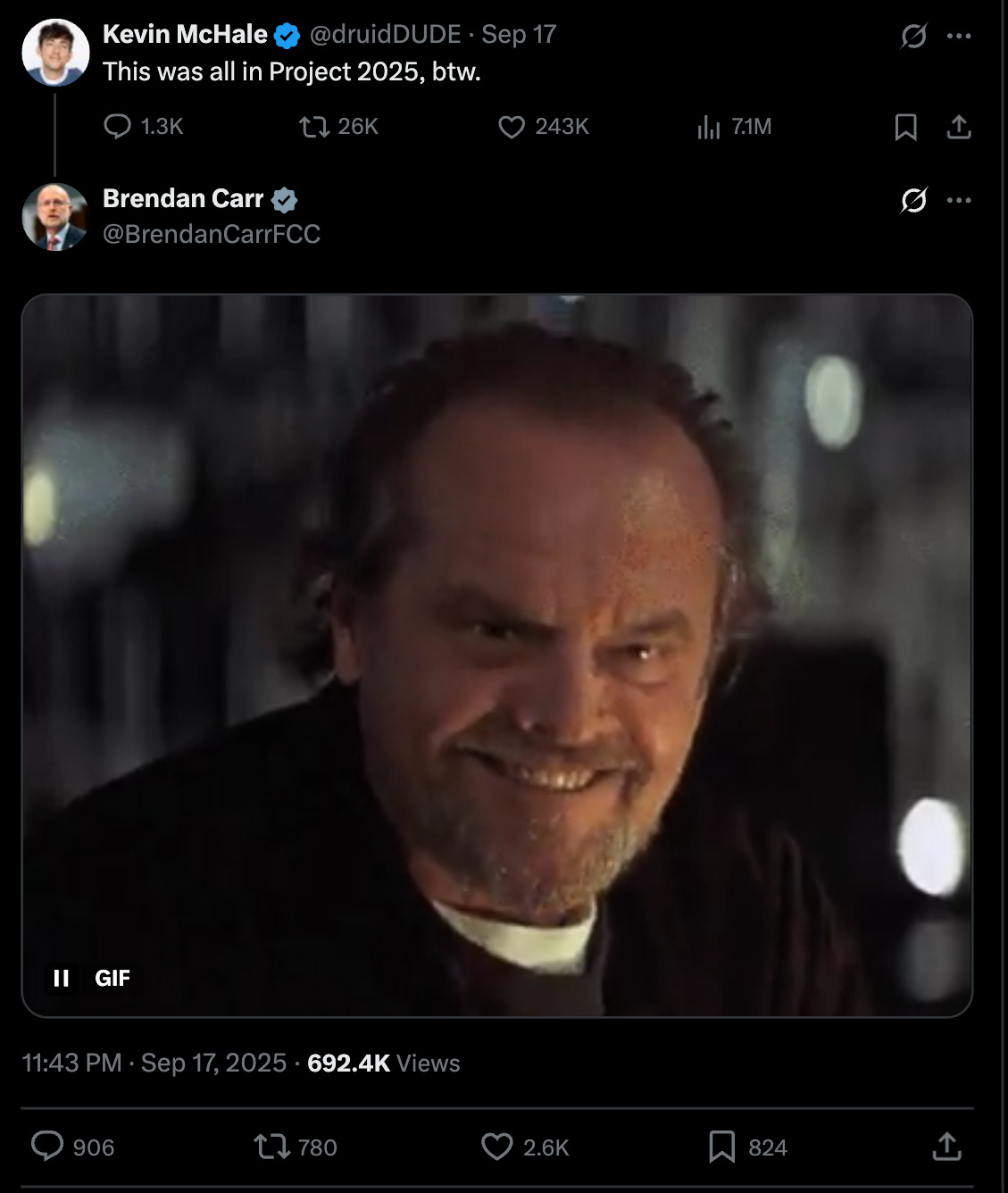
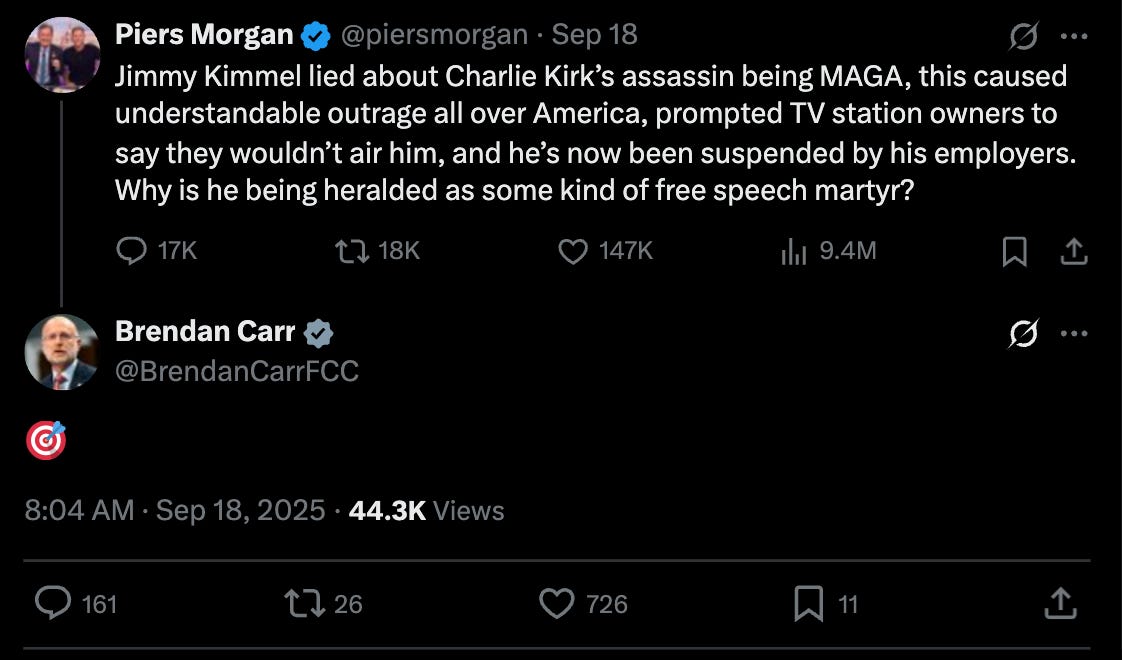

Great and thorough overview. It's a real shame those of us who care about free speech now are forced defend untalented talk show hosts with one-track careers built on "clapter" for tiny audiences.
If ABC and/or Disney aren't interested in pushing back, does anyone else having standing to challenge Carr in court?
I care about free speech and admire your work.
ABC's local affiliates get the government granted right to exclusive use of certain spectrum, granting the network (and others like it) an unfair broadcast advantage. In return, these networks are supposed to serve the public interest in some way, which at a minimum means not allowing themselves to become partisan mouthpieces for one political faction.
But that's exactly what networks like ABC have become and the problem now goes back decades. Late night is a particularly stark reminder for both how rabidly and viciously partisan these hosts have become in the Trump years at the same time as they abandoned during the Obama years their predecessors previous commitment to ribbing whoever the current White House occupant was, regardless of party.
If ABC doesn't like its programming coming under scrutiny from the government, it can either abandon its partisan behavior or its unfair broadcast advantage.
The claim that it should be allowed to have it both ways - unfair government granted advantage mixed with highly partisan content - is actually an attack on the ability of those who disagree with ABC's partisan perspective to compete fairly and freely in the marketplace of ideas, and is part of the reason why things have gone sideways politically in the United States (and also part of the reason why Donald Trump got a seat behind the resolute desk.)
The answer for the institutions complaining because their abuse of the public trust is now facing consequences is as clear as its ever been: cut out the partisan behavior and be responsible stewards of the public interest, or have your privileges removed.
Free speech advocates should favor this.